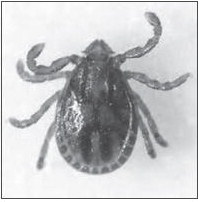In the Short Rows: - The Asian Longhorned Tick


In the Short Rows:
I’ve gotten a couple of calls lately regarding cattle and the Asian Longhorned Tick (Haemaphysalis longicornis) – a species of tick that is speculated to have been in the United States since around 2010. It was first identified in New Jersey in 2017 and has since been making its way down the east coast, with the first Georgia sighting in 2021. Experts are still studying the effect this tick may have on U.S. agriculture and the environment.
The Asian Longhorned Tick can be found anywhere in the environment, but prefers tall grasses and wooded areas. They attach to and feed on a large number of hosts, including people, livestock species, domesticated pets, and wildlife. This species of tick is parthenogenetic, which means it does not need a male to reproduce. Females can lay eggs by the thousands, which in turn produce more eggs. The ticks antagonize cattle and other livestock and pet species by feeding on them in large numbers, sometimes hundreds at the time on a single animal. This can result in illness, reduced productivity, or in the worst case, fatality.
Asian Longhorned Ticks are light brown and smaller than a sesame seed in size. They are often difficult to detect because of their size and quick movement. These ticks are known to carry Theileria orientalis “Ikeda”, which can be fatal to cattle. Currently, there is no effective treatment for this disease. They can also carry a number of other bacteria, and have the potential to cause a red meat allergy through their bite.
So what can you do to be proactive? The good news is that any tick product labeled for use in your species of animal, whether that be cattle, sheep, goats, dogs, or cats, is effective against the Asian Longhorned Tick. Regularly inspect your animals for ticks, and remove and kill any you find on your animals- the recommended way is by dropping them into a bottle of rubbing alcohol. Check yourself and friends/family members for ticks as well, especially after being outside.
If you believe you have found Asian Longhorned Ticks, or any unusual tick population or activity, call the Georgia Department of Agriculture Animal Health Section at 404-656-3667. If you have any questions, please feel free to contact the Montgomery County Extension Office at 912583-2240.






